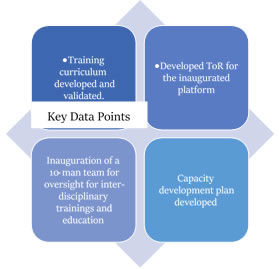 Capacity development rests on the principle that people are best empowered to realize their full potential when the means of development are sustainable- home-grown, long-term, generated, and managed collectively by those who stand to benefit.
Capacity development rests on the principle that people are best empowered to realize their full potential when the means of development are sustainable- home-grown, long-term, generated, and managed collectively by those who stand to benefit.
This was (Health Systems Consult Limited’s (HSCL) outlook as the technical team providing interventions for improving the Human Resource for Health (HRH) of Kaduna state.
The health system in Kaduna state struggles with the inadequacy of HRH. The most recent staff analysis (2017) conducted by the State Ministry of Health (SMoH) identified significant shortages across the health workforce with the health worker population ratio below the World Health Organization (WHO) minimum threshold for the HRH crisis point.
Kaduna State has made efforts in improving her HRH indices had instituted an HRH reform process and developed policies including the state strategic plan 2017-2021 aimed at addressing health workforce gaps and improvement of efficiency and effectiveness for Human Resource for Health (HRH) management in the State. However, considering the changing terrain of HRH needs and the availability of funding, there was a need to strengthen areas in need of improvement; the poor coordination between health professional staff across cadres and a widespread perception that it is government’s sole responsibility to address all the health labor market challenges.
With the support of the Global Fund (GF) and the  Principal Recipient (MSH), HSCL through the Resilient and Sustainable Systems for Health (RSSH) project responded to the identified HRH gaps by commencing with an initial engagement with key stakeholders in Kaduna State; these strategic partnerships involved government and all the top officials across the MDA’s in the health sector; SMoH, Kaduna Stet Primary Health Care Board (KSPHCB), colleges and state health institutions, Kaduna State AIDS Control Agency (KADSACA), Kaduna State Health Supplies Management Agency (KADHSHMA), proposing targeted interventions via cohesiveness and capacity development.
Principal Recipient (MSH), HSCL through the Resilient and Sustainable Systems for Health (RSSH) project responded to the identified HRH gaps by commencing with an initial engagement with key stakeholders in Kaduna State; these strategic partnerships involved government and all the top officials across the MDA’s in the health sector; SMoH, Kaduna Stet Primary Health Care Board (KSPHCB), colleges and state health institutions, Kaduna State AIDS Control Agency (KADSACA), Kaduna State Health Supplies Management Agency (KADHSHMA), proposing targeted interventions via cohesiveness and capacity development.
Stakeholders expressed interest; however, concerns were raised regarding funding needed to push these interventions.
HSCL designed a cohesive leadership platform that would aid coordination of the interdisciplinary education and training of health care professionals across all the cadres ensuring capacity gaps are identified and strategic training are provided. The approach seeks to strengthen health workforce skills and capacity for optimal service delivery to beneficiaries at all levels of service provision in the state.
Armed with the understanding of the change- resistance mindset of the health workers, it was important for HSCL to foster state ownership.
This was done by selecting key individuals across the different health cadres, health departments, and the State Ministry of Health to head the inaugurated platform. The platform members would lead the education and training of health care professionals from different disciplines in the provision of coordinated services.
This evoked much enthusiasm and buy-in from all the key stakeholders with a consensus on the importance of the capacity building towards improving the HRH of the state.
As a result, written agreements were made, roles and responsibilities of the platform were set including their modes of operations, targets, and deliveries. Additionally, a review of the budget percentage allocated to training health workers was proposed with eager plans in motion for the first inter-disciplinary training and education for the health workers in the state.
These interventions have remarkably caused a mindset shift of the stakeholders from relegating all responsibility for change to the government.
Overall, the immediate partnerships and coordination following this training showed by the participants was yielding more integration among cadres of health care staff. In the long run, we anticipate a wider reach and longer-lasting impact of these interventions on the capacity building and coordination of not just the current but also the newer members of the health workforce in Kaduna thus, ultimately strengthening of her health sector and improving health outcomes of citizens whom they serve.





